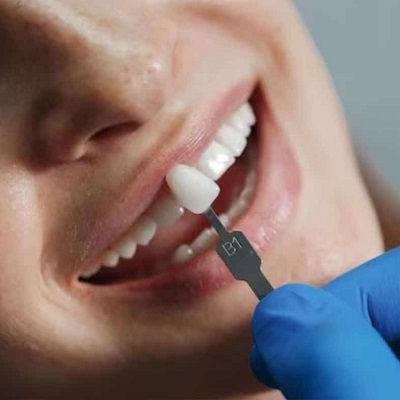Myths About Composite Veneers Debunked
- aliza khan
- Aug 11, 2025
- 4 min read
Cosmetic dentistry has grown rapidly in the UAE, with Composite Veneers Dubai treatments becoming increasingly popular for people who want a brighter, more even smile without undergoing invasive procedures. However, like many cosmetic treatments, there are a lot of myths and misconceptions surrounding composite veneers—often preventing people from exploring them as a viable option.
This article will separate fact from fiction, addressing the most common myths about composite veneers so readers can make an informed decision about their dental health and smile goals.
Understanding Composite Veneers:
Before tackling the myths, it’s important to know what composite veneers are. Composite veneers are thin layers of tooth-colored resin material applied directly to the surface of the teeth. Dentists shape the material to enhance size, shape, and color, then harden it with a special curing light.
They can correct:
Stained or discolored teeth
Chipped or broken teeth
Small gaps between teeth
Slight misalignment or uneven edges
Unlike porcelain veneers, which are fabricated in a dental lab, composite veneers are often completed in a single visit—making them both time-efficient and cost-effective.

Myth 1: Composite Veneers Look Fake:
One of the most common misconceptions is that composite veneers look artificial. In reality, modern composite materials are designed to closely mimic the natural color, texture, and translucency of real teeth.
The truth: When applied by a skilled cosmetic dentist, composite veneers blend seamlessly with the surrounding teeth, giving a natural and aesthetically pleasing appearance. In Dubai, where cosmetic dentistry standards are high, dental clinics use advanced resin technology and shading techniques to ensure a realistic finish.
Myth 2: Composite Veneers Don’t Last Long:
It’s true that composite veneers may not last as long as porcelain veneers, but that doesn’t mean they have a short lifespan. With proper care, composite veneers can last anywhere from 4–8 years, and sometimes longer.
The truth: Longevity depends on oral hygiene, dietary habits, and avoiding activities like nail-biting or chewing on hard objects. In Dubai, many dentists also offer maintenance services such as polishing or touch-ups to keep veneers looking new for years.
Myth 3: They Are Only for Cosmetic Purposes:
Some people believe composite veneers are purely for vanity and have no functional benefits. While they are primarily used for aesthetic improvements, they can also strengthen and protect teeth with minor damage.
The truth: Composite veneers can restore chipped or worn edges, protect enamel from further wear, and even improve bite alignment in certain cases. This makes them both a cosmetic and functional dental solution.
Myth 4: Composite Veneers Are Painful to Apply:
Many people hesitate to get veneers because they assume the procedure will be painful or require extensive drilling.
The truth: The application of composite veneers is minimally invasive. In most cases, little to no enamel is removed, and local anesthesia is rarely needed. Patients typically experience no pain—just the excitement of seeing their smile transformed in a single visit.
Myth 5: They Stain Easily and Quickly:
While composite veneers are more prone to staining than porcelain, they are not as delicate as many think. Modern composite materials are far more stain-resistant than older versions.
The truth: With proper care—like limiting coffee, tea, and tobacco use—composite veneers can maintain their brightness for years. Additionally, professional polishing can remove minor stains and restore their shine.

Myth 6: They Are Expensive and Out of Reach:
Some people think veneers are a luxury only celebrities can afford.
The truth: Composite veneers are significantly more affordable than porcelain veneers, making them a practical option for many patients in Dubai. Many clinics also offer payment plans, making the treatment even more accessible.
Composite Veneers vs. Porcelain Veneers – Clearing Up Confusion:
It’s worth noting the main differences between composite and porcelain veneers to further dispel myths:
Feature | Composite Veneers | Porcelain Veneers |
Material | Tooth-colored resin | Ceramic/porcelain |
Application | Directly sculpted in-office | Custom-made in lab |
Treatment Time | Often 1 visit | 2–3 visits |
Cost | Lower | Higher |
Durability | 4–8 years | 10–15+ years |
Reparability | Easy to repair | Requires replacement if damaged |
Both options can produce stunning smiles, but composite veneers offer speed, flexibility, and affordability—qualities that make them appealing to a wide audience.
Tips for Maintaining Composite Veneers:
To get the most out of composite veneers, follow these care tips:
Brush twice daily with a soft-bristled toothbrush.
Floss daily to prevent gum problems.
Avoid biting into hard objects like ice or pens.
Limit foods and drinks that can stain teeth.
Schedule regular dental check-ups for polishing and maintenance.
Final Thoughts:
The myths about composite veneers often discourage people from discovering a treatment that could dramatically improve their smile. In reality, Composite Veneers Dubai clinics provide high-quality, natural-looking, and affordable solutions for those seeking both cosmetic and functional dental improvements.
By understanding the facts, patients can make confident decisions about enhancing their smile without being swayed by misinformation.
FAQs:
1. Do composite veneers damage natural teeth?
No, composite veneers typically require minimal preparation, preserving most of the natural tooth structure.
2. How quickly can I get composite veneers?
In many cases, they can be applied in a single dental visit.
3. Can composite veneers be whitened?
No, whitening treatments do not work on composite material. Stains can be polished away, but for major discoloration, replacement may be necessary.
4. Are composite veneers reversible?
Yes, they are considered reversible since minimal enamel is removed, unlike porcelain veneers.
5. Can I eat normally with composite veneers?
Yes, but avoid biting into very hard foods to prevent chipping.
6. Are composite veneers suitable for everyone?
Most people are good candidates, but a dentist will evaluate oral health to determine eligibility.



Comments